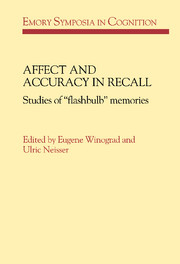Book contents
- Frontmatter
- Contents
- Preface
- List of contributors
- 1 Introduction
- Part I Empirical studies
- 2 Phantom flashbulbs: False recollections of hearing the news about Challenger
- 3 Potential flashbulbs: Memories of ordinary news as the baseline
- 4 Flashbulb memories: Confidence, consistency, and quantity
- Part II Developmental studies
- Part III Emotion and memory
- Part IV Theoretical issues
- Author index
- Subject index
2 - Phantom flashbulbs: False recollections of hearing the news about Challenger
Published online by Cambridge University Press: 22 March 2010
- Frontmatter
- Contents
- Preface
- List of contributors
- 1 Introduction
- Part I Empirical studies
- 2 Phantom flashbulbs: False recollections of hearing the news about Challenger
- 3 Potential flashbulbs: Memories of ordinary news as the baseline
- 4 Flashbulb memories: Confidence, consistency, and quantity
- Part II Developmental studies
- Part III Emotion and memory
- Part IV Theoretical issues
- Author index
- Subject index
Summary
When I first heard about the explosion I was sitting in my freshman dorm room with my roommate and we were watching TV. It came on a news flash and we were both totally shocked. I was really upset and I went upstairs to talk to a friend of mine and then I called my parents.
I was in my religion class and some people walked in and started talking about [it]. I didn't know any details except that it had exploded and the schoolteacher's students had all been watching which I thought was so sad. Then after class I went to my room and watched the TV program talking about it and I got all the details from that.
The two memories above are actual written responses to the question “How did you first hear the news of the Challenger disaster?” The first account was given in the fall of 1988, long after the event, by an Emory senior whom we will call “RT.” It was a vivid recollection, which met or exceeded all the standard tests of a “flashbulb memory.” Asked for 5-point confidence ratings of various aspects of the memory, RT hit the top of the scale: 5 on How did you hear it? (television), Where were you? (her room), What were you doing? (watching television), Who was with you? (roommate), and How did you feel? (shocked and upset).
- Type
- Chapter
- Information
- Affect and Accuracy in RecallStudies of 'Flashbulb' Memories, pp. 9 - 31Publisher: Cambridge University PressPrint publication year: 1992
- 241
- Cited by



